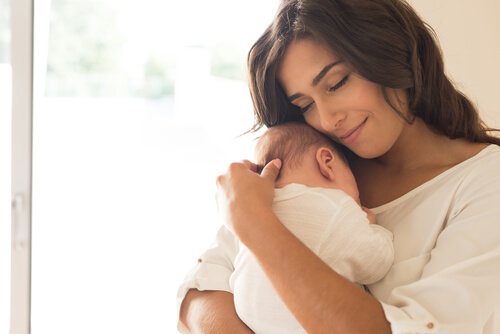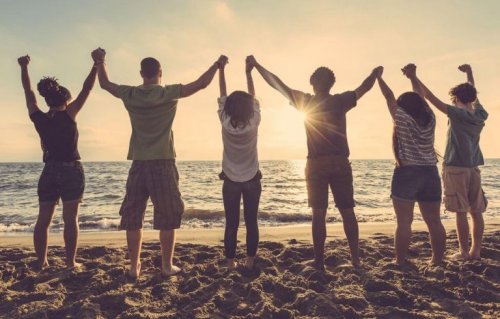Feeling Protected Makes Us Happy

All human beings need protection. Sometimes we’re fragile and feel a deep need to be protected. This is a fundamental need that exists from the time we’re born until the day we die. Feeling protected helps us create healthy attachments with those around us.
The desire and the need to be protected aren’t always intense. Obviously, these feelings are stronger when you find yourself in a vulnerable position. For example, when you’re sick or just moved to a new place. Basically, these feelings intensify when you have to face a situation that is inherently risky or unknown.
The fundamental need to be protected also increases if you’re in a fragile emotional state. In moments of insecurity, desperation, or anxiety, you feel a greater need for people and places that make you feel safe. Deep down, we all identify with these feelings. However, are you really cultivating and strengthening these protective bonds in your life?
“The true measure of the justice of a system is the amount of protection it guarantees to the weakest.”
-Aung San Suu Kyi-
The origin of feeling protected
In reality, being protected and feeling protected are two different things. Sometimes they go hand-in-hand, but sometimes they don’t. Feeling protected supposes a subjective certainty that you have the support you need to get out of a situation that you can’t leave on your own. Being protected is more concrete. It refers to that theoretical support actually taking action.
Feeling protected is a comforting feeling. You experience it in the first years of your life, and it depends largely on your mother or whoever takes her place. In the first stages of your life, you’re imprinted with a seal of protection or the lack thereof.
Your mother’s presence, or the presence of an adult who takes care of you, makes you feel as if nothing bad could ever happen to you in those early years. However, the truth is that anything could happen. But it doesn’t feel that way.
The opposite is also true. If a person’s mother or caregiver is absent, the whole world seems threatening to them. That feeling sticks with them for the rest of their life. It affects the way they relate to other people and the world as they get older.

Being protected: A question of attachment
When you grow up feeling protected, you learn to trust others and yourself. As a result, it’s easy to create close emotional bonds with other people. On the flip side, if you felt unprotected when you were small, it’ll be difficult for you to become emotionally attached to other people.
This defenselessness can also make it hard for you to know how to protect others. You either neglect to care for others in this way or you feel excessively jealous.
Along those same lines, it can lead you to put up a front to the world. This brave front is a replacement for the protection that you never had. You look for non-threatening surroundings and hide there. It might be a job, an addiction, a romantic partner, anything that allows you to avoid feeling exposed and at risk. You feel safe there, and that makes it hard to leave. The price, however, is quite high.
Routines and protective relationships
If you carry around the weight of having always felt vulnerable, that doesn’t mean you have to stay stuck there. There is plenty you can do to change your situation. The first thing you have to do is be aware of this emptiness. Know that it makes you more susceptible to fear, insecurity, and self-absorption. It takes courage to avoid being consumed by it, but it’s possible.
You have to recognize the importance of creating protective bonds with other people. You have to learn to give what you never had. Sometimes the best way to learn this is by teaching someone else. That is true with the feeling of being protected. If you learn to protect other people, it’ll probably help you feel less empty. Not only that, but you’ll probably get back from other people what you give to them.

If you felt vulnerable as a child, you probably have a lingering fear or feeling of being excluded and left out. To eradicate that feeling, you have to develop certain routines and habits that make you feel included. Being part of a stable group is a way to make you feel more confident in the world.
Isolating yourself and putting up walls isn’t a good idea. It won’t make you feel safer and you won’t feel protected at the end of the day. On the contrary, your fears will intensify. As scary as it is, you have to open the door and let the sun shine through.
This text is provided for informational purposes only and does not replace consultation with a professional. If in doubt, consult your specialist.








